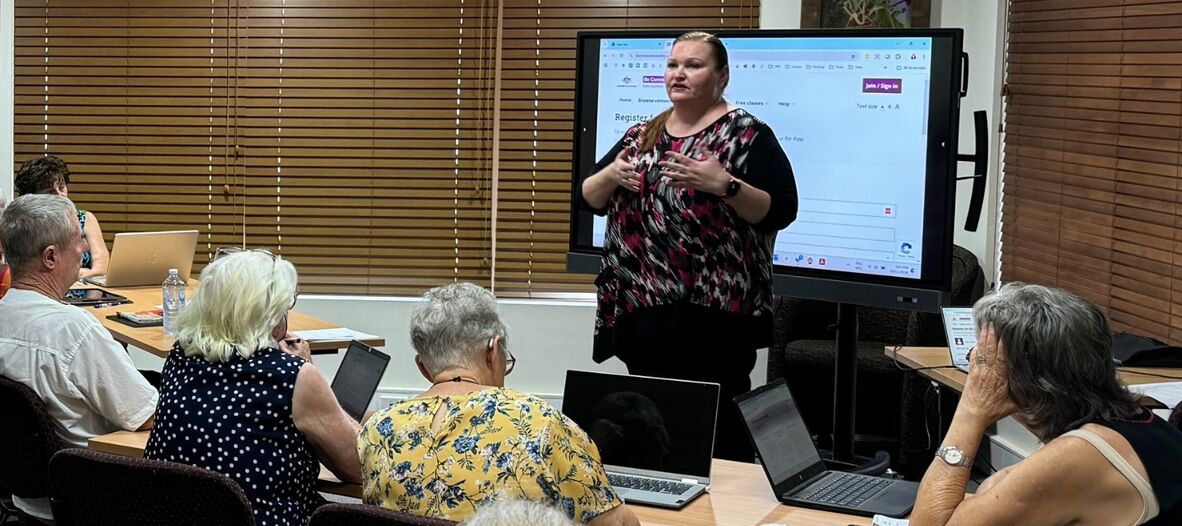Free digital workshops help older Australians to strengthen digital skills and build resilience against online threats
By Melissa Reynolds | 1 February 2025

In today's digital world, people of all ages are expected to know how to use the internet, access services, and communicate online. Yet this also exposes them to risks like identity theft, financial scams, and other threats to personal safety. For many older Australians, managing these risks comes with unique challenges, such as unfamiliarity with new technologies and increasingly sophisticated digital fraud.
Personal stories about scams and phishing attempts are frequently raised during lively discussions at digital skills workshops that State Library’s Digital and You program runs for older Australians in Far North Queensland.
The ‘Building Digital Skills 50+’ workshops are free to attend and cover essential skills for everyday online activities, from learning more about digital devices to understanding cyber safety.
State Library’s Regional Digital Development Officer Ricky Clark works with local councils to host the series in public libraries with guest presenter and Digital Strategist Nicky Jurd.
Ricky explains that the workshops are designed to be both social and informative so participants can gain valuable digital skills and connect with others in a supportive environment.
“Nicky brings the workshops to life by using real-life examples to highlight common and emerging scams and attacks, including those involving QR codes, social media, and email,” Ricky said.
“The interactive nature of the sessions encourages attendees to share their own experiences and learn from one another.
“We’ve already heard countless anecdotes from our participants about their personal encounters with phishing attempts, exposure of personal information after cyber breaches, and even a scam instigated through someone’s social media account.
“After those experiences, it’s incredibly rewarding to see participants leave our workshops feeling more confident and secure in accessing digital services at home, while the sessions also foster a sense of community and mutual support”.
The workshops are funded through Be Connected, an Australian Government digital inclusion initiative, and the Queensland Government’s Our Thriving Digital Futures, Digital Economy Strategy.
Digital exclusion combined with fears about online threats are a significant concern in Australia. Statistics from the Australian Digital Inclusion Index indicate that over 30% of the most digitally excluded people reduce their internet use due to concerns about privacy and scams, compared with only 7.9% of highly included people.
Find a free digital skills workshop
The Building Digital Skills 50+ workshops are free to attend; all you need to bring is your laptop, digital tablet or smartphone.
Find a workshop near you:
-
Tuesday 4 February 2025, 2:30 pm to 4:30 pm, Earlville Library
-
Wednesday 26 February 2025, 1:00 pm to 3:00 pm, Innisfail Library
-
Monday 10 March 2025, 10:30 am to 12:30 pm, Gordonvale Library
-
Tuesday 25 March 2025, 11:30 am to 1:30 pm, Mareeba Library
-
Wednesday 2 April 2024, 2:00 pm to 4:00 pm, Cardwell Library
-
Friday 4 April 2024, 11:00 am to 1:00 pm, Malanda Library
-
Tuesday 13 May 2025, 2:00 pm to 4:00 pm, Dimbulah Library
-
Tuesday 3 June 2025, 1:00 pm to 3:00 pm, Smithfield Library
-
Friday 6 June 2025, 11:00 am to 1:00 pm, Ravenshoe Library
-
Thursday 12 June 2025, 11:30 am to 1:30 pm, Kuranda Library
-
Friday 20 June 2025, 2:00 pm to 4:00 pm, Mission Beach Library
-
Thursday 26 June 2025, 11:00 am to 1:00 pm, Mount Garnet Library
-
Wednesday 2 July 2025, 11:30 am to 1:30 pm, Chillagoe Library
-
Tuesday 5 August 2025, 2:00 pm to 4:00 pm, Babinda Library
-
Friday 8 August 2025, 2:30 pm to 4:30 pm, Tully Library
Make a booking using the links above or download and book a place through State Library’s Digital and You app www.digitalandyou.com.au/app
You can also access a range of free online digital tools and courses to learn more about the things you can do to protect your privacy and stay safe online.
Comments
Your email address will not be published.
We welcome relevant, respectful comments.